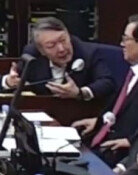Gov¡¯t announces corporate governance reform bill
Gov¡¯t announces corporate governance reform bill
Posted October. 27, 2000 11:00,
Class action suits, a legal complaint filed for compensation in securities-related cases on behalf of a group of minority shareholders, will be introduced in stages; however, the cumulative voting system, under which small shareholders may vote for a certain candidate for board membership, will not be made mandatory, although the necessary requirements for the system will be eased.
These decisions came at a ruling party-government policy consultative meeting and an economic ministerial meeting, where a consensus for the corporate governance reform bill to promote transparent corporate management was made. The government will revise the related laws and enforce the new systems starting next year.
An official of the Ministry of Finance and Economy explained that the Justice Ministry will prepare measures to phase in the class-action suit system, which will initially be applied to large firms and then to smaller ones.
With regard to making the cumulative voting system mandatory, which has been called for by civic groups, the government decided not to make the system a legal obligation, but it will ease the qualifications for voting from those holding 3% of a company¡¯s shares to 1%. Also, in order to reduce the influence of major shareholders, all shareholders holding over 3% of a company¡¯s shares will have the exercise of their voting rights limited to 3%.
In addition, in order to raise the efficacy and impartiality of the external director system and strengthen supervision of illegal insider transactions, a candidate holding shares of a company or its affiliated firms or anyone involved in any financial transactions with the company will not be eligible to be appointed as an outside director.
Meanwhile, the Ministry of Finance & Economy and the ruling Millennium Democratic Party nullified the plan to give the Financial Supervisory Commission (FSC) as many investigative rights over illegal corporate trading activities as the Fair Trade Commission. They agreed that it is undesirable to expand the FSC¡¯s powers in the current situation where the powers of the FSC and Financial Supervisory Service are being questioned as shown in the illegal loan case of Dongbang Mutual Savings and Finance.






![[사설]참 구차한 김병기 전 원내대표](https://dimg.donga.com/c/138/175/90/1/wps/NEWS/IMAGE/2026/01/13/133151454.1.jpg)
